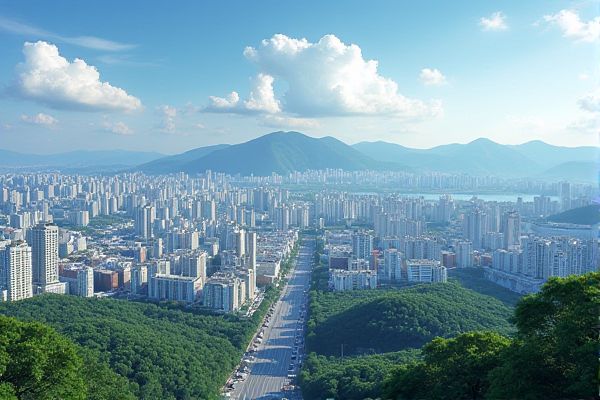
Education system and best schools in South Korea: Focus on rigorous academics and discipline. Education system highly competitive and structured. High emphasis on standardized testing performance. 12-year compulsory education, K-12 system. Prestigious schools located primarily in Seoul. Specialized high schools for sciences and arts. Hagwons widely utilized for extra tutoring. Curriculum includes technology and English language. International schools offer diverse curriculums. School year starts in March, ends in February.
Focus on rigorous academics and discipline.
South Korea's education system is highly rigorous and disciplined, with students spending long hours studying each day. This system places a strong focus on test results and maintains a strict adherence to discipline and respect for elders, which has led to high achievements in international educational events. The education structure is divided into six years of primary school, three years of middle school, and three years of high school, with a significant emphasis on academic performance and preparation for competitive university admissions. To gain a deeper understanding of these dynamics, the Rigorous Educational System of South Korea provides comprehensive insights and explanations.
Education system highly competitive and structured.
The education system in South Korea is highly competitive and structured, comprising 6 years of compulsory elementary education, followed by 3 years of middle school and 3 years of high school. This system emphasizes subjects such as English, Korean, Maths, and Science, and is characterized by strict discipline and a strong focus on academic achievement. Renowned for its academic rigor, students often attend private academies, known as hagwon, outside regular school hours to enhance their studies. A particularly significant aspect of this system is the high-stakes College Scholastic Ability Test, which plays a crucial role in determining university admission.
High emphasis on standardized testing performance.
In South Korea, the education system places a high emphasis on standardized testing, particularly the College Scholastic Aptitude Test (Suneung), which is crucial for university admissions and significantly influences students' future career prospects. The entire education system from primary to secondary schooling is geared towards preparing students for this test, with a strong focus on memorization and direct instruction, although recent reforms aim to shift towards more critical thinking and fairness. Insights from this rigorous approach can provide valuable lessons, as highlighted in this article on the World Economic Forum, which explores potential takeaways for the United States, considering the importance of education reform.
12-year compulsory education, K-12 system.
In South Korea, the education system consists of 6 years of compulsory elementary education, known as Chodeung-hakgyo, followed by 6 years of secondary education, which is divided into 3 years of middle school and 3 years of high school, forming a comprehensive 12-year compulsory education. This highly structured system places a significant emphasis on academic rigor and discipline. Additionally, students frequently attend private schools, termed Hagwon, to receive further instruction. For more detailed information on this structured educational approach, you can visit the South Korean Education System.
Prestigious schools located primarily in Seoul.
In Seoul, prestigious international schools include Korea International School, Dulwich College Seoul, Yongsan International School, Seoul Foreign School, and Dwight School Seoul, each offering high-quality education with various curricula such as American, British, and IB programs, and are recognized for their academic excellence and global connections. These schools are highly competitive and prepare students for top universities worldwide. For more detailed information, explore the Best International Schools in Seoul to find a perfect fit for your child's educational needs.
Specialized high schools for sciences and arts.
In South Korea, specialized high schools such as art high schools, science high schools, and foreign language high schools provide focused education in specific subjects to prepare students for their future careers and academic pursuits. These schools are an integral part of the broader high school system, which also encompasses general high schools, vocational high schools, and autonomous high schools. For more comprehensive details on this topic, you can explore the Education System in South Korea guide.
Hagwons widely utilized for extra tutoring.
In South Korea, Hagwons are widely utilized private educational institutions that provide extra tutoring, often compared to cram schools. They focus on subjects like English, mathematics, and preparation for the College Scholastic Ability Test, with nearly 78.3% of grade school students attending them for an average of 7.2 hours weekly. For more information on the impact and structure of these institutions, you can visit the Hagwon page on Wikipedia.
Curriculum includes technology and English language.
In South Korea, the education system is heavily supported by the government, with a strong focus on integrating technology and English language into the curriculum. The Ministry of Education has introduced initiatives such as AI digital textbooks and smart learning platforms, starting with subjects like math, English, and information-related curriculums, to provide personalized learning experiences. For more detailed insights into these pioneering initiatives, you can explore the South Korea Education Technology report, which highlights how such advancements in educational tools are shaping the future of learning.
International schools offer diverse curriculums.
International schools in South Korea offer diverse curriculums, including American, British, and International Baccalaureate (IB) programs, with many schools such as Seoul Foreign School, Dwight School Seoul, and Korea International School providing a range of educational pathways from pre-Kindergarten to Grade 12. For more detailed information, you can explore the offerings of these schools on the International Schools in South Korea website.
School year starts in March, ends in February.
The school year in South Korea starts in the first week of March and ends in February, divided into two semesters: the first from March to July and the second from September to February, with winter and summer vacations in between. For more detailed information, you can visit the website of the Asia Society which provides an in-depth exploration of the South Korean education system.
